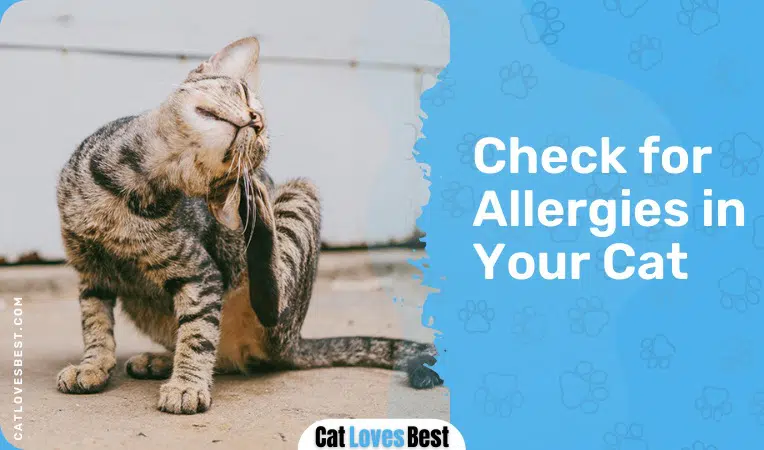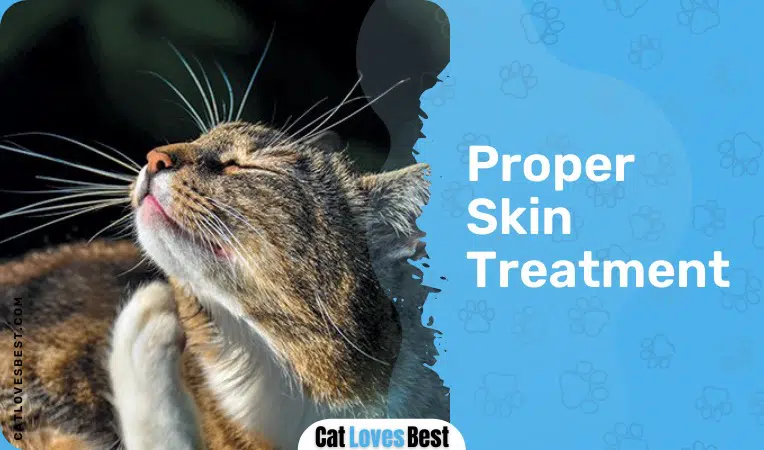Cats are infamous for having weird habits, but some people don’t know that there might be a reasonable excuse for them. As we all know, cats like to groom themselves by licking or scratching.
But when the scratching goes out of hand, you will be concerned and will find yourself searching, “how to stop a cat from scratching herself?”
If you are one of those cat parents whose cats are suffering from excessive scratching and if you are looking for a permanent solution, then you are at the right place.
Let’s deep dive into this blog that will help to improvise your cat’s life.

Why Do Cats Scratch Themselves?
There can be many reasons for cats to scratch, it is one of the healthy habits seen in cats. But if a cat is scratching herself, then it can be a matter of concern.
Now let’s look at some of the common reasons why cats scratch themselves.
The Parasite Problem
These are the little creatures that are one of the main reasons for this act of cats scratching themselves. In fact, there are many types of parasite that reside on the skin, eyes, and in the anus of cats that causes serious scratching problems.

Some are visible from the naked eye while some are too small to be seen. They can easily make your pet their host. Likewise, the most common visible parasite is Ringworm or Tapeworm, while Toxoplasma gondii is a bacterial parasite that can’t be seen with the naked eye.
Parasites are the most common yet most dangerous reason for scratching and forming diseases in cats. They can cause itching in cats, that’s why cats scratch their eye, ears, neck, or face. This can be the main reason why cat scratches their eye.
Emerging Allergies
There are many types of allergies cats suffer from, like food allergies, environmental allergies, flea bite hypersensitivity, or contact allergies, all these types of allergies can cause serious side effects including excessive scratching.

All these types of allergies have one thing in common, and that is an inflammatory issue, which is the main reason why a cat might be scratching more often. Usually, most of the cats are indoor cats as a result, the chances of food allergy are high, and the other is flea bite allergy, which can be the effect of flea bites or a high amount of mosquito bites.
Certain types of environment, food allergies in cats, or animal and plant contact can be the prime reason behind these emerging allergy problems. It is a matter of concern as it causes skin disease that results in unbearable itching and red marks on the skin of the cats.
Boredom, Compulsive Disorder, or Getting Anxious
Just like humans, cats also suffer from some types of mental disorder and knowing or unknowing they pick up habits like chewing, licking, or scratching behavior. Cats suffering from a compulsive disorder or anxiousness need proper treatment and attention.

This problem is often witnessed in indoor cats, as they tend to receive fewer activities and physical exercise in comparison to outdoor cats.
They like to be active and play around, but at the same time, they get bored easily. If you see your cat not playing with her toys like she used to, and instead she sits and starts randomly scratching herself, then that might be an indication of anxiety effects or boredom.
Your Cat Has Dry Skin
The main symptom of having dry skin is that white dandruff-like flakes appear in the fur and the other effect is hair loss as more the scratching due to dry skin. Thus, the biggest sign of having dry skin is dull-looking fur and hair loss on cats.

The most common reason for this dry skin can be the dry air, change in grooming techniques, bathing issues, nutritional deficiency, etc. It is not a type of serious problem, but it can make your cat restless and uncomfortable.
Sometimes, lack of humidity in the air can also cause dry skin and cat to itch, especially in winters. However, dry skin in cats can be treated easily with proper diet, medication and, moisturizing lotion.
Other Things That Causes Cats to Scratch
- Infection from common food ingredients like yeast infections, chocolates, garlic, etc. They can also get bacterial infections that can cause red patches and itchiness.
- Bug, insects bites, and ear mites in ear canal have the same effect on cats as humans. Cats scratch uncontrollably, and ears in cats will have a swollen patch on the area where an insect or a bug has bitten.
- Environmental factors can affect a cat in more than one way, you can imagine. Some houseplants or flowers can have an adverse effect on cats which includes sneezing, coughing, and scratching.
How to Stop A Cat From Scratching Herself
You can try it all, but once a cat adopts a scratching habit, it is hard to stop her from practicing it. Instead, try preventing her or providing her with some solution that will not only help the cat to put an end to the scratching habits, but also lead a healthy lifestyle.
Get Rid of Parasites
There are several types of parasites some are internal, some are roaming on the cats, some are visible by a naked eye and some can’t be seen easily. But all of these parasites have one thing in common, that they are both painful and concerning for cats.

It doesn’t matter if you have an outdoor or indoor, the parasite can enter your home and infest your cats easily. Unfortunately, if you notice the symptoms of parasites, making an appointment with your veterinarian immediately can be a good idea.
For cats, a parasite prevention treatment is necessary to avoid unwanted parasite attacks, but you can start the parasite treatment for her nevertheless. Every type of cat needs regular parasite treatment according to her diagnostic tests and risk factor.
Check for Allergies in Your Cat
Cats suffer from many types of allergies depending on their lifestyle. Like most, outdoor cats can get allergies like environmental allergies and flea bite hypersensitivity due to airborne allergens, while an indoor cat is most likely to be allergic to certain types of food.

As a responsible cat parent, you should always pay attention to the emerging symptoms of allergies in cats and start the treatment as soon as possible. Some common symptoms to look after are scratching, sneezing, and coughing.
You can also try some home remedies like an elimination diet, throwing away toxic houseplants that are harmful to cats, getting her regularly checked for fleas, etc. Allergies can be mild, but if not treated on time and taken care of, the allergy might develop into a life-threatening issue.
Try to Reduce Anxiety or Boredom
If you feel like even after trying every remedy and treatment, your cat still scratched at her ears, eyes, and face, you should take your cat to the vet and have her check for any mental illness.

Indoor cats are more likely to be bored and anxious. For preventing this situation, you should try to take your cat for an outdoor tour sometimes, that might help her get the normal behavior back.
In the matter of outdoor cats, you can practice things like changing the home environment, bringing her to a more quiet place, ensuring the cat about safety, provide her with a little extra treat that may help to reduce anxiety in her.
Proper Skin Treatment
Cat’s skin is a bit sensitive and needs proper treatment and care to stay healthy and glowing. Certain changes in the weather, food supplements, bathing or skin products, might be the reason for dry skin or emerging dandruff on the fur, which might cause the habit of scratching herself.

In cold weather, due to the dry winds, cats skin can easily get dry, so to stop this you can use a humidifier or try using proper moisturizer for cats. Moreover, certain bathing and moisturizing products can be harmful to cats, so it is better to consult a cat specialist or do some research yourself.
Being nutrition deprived or not having the required amount of wet food can also cause dry and flaky skin amongst cats. To prevent this type of effect on cats, be sure to feed her more wet food and food enriched in omega-3 and omega-6.
To Conclude
We all like to admire our cats using their paws in various ways, but scratching herself is not one of them. Sometimes a little scratching on the nose and ears might be satisfactory for her, but it might have an adverse effect if the scratching continues for a long time.
Well to conclude, the effects of scratching can be bad for cats, so to summarize the answer to “how to stop a cat from scratching herself?” I would like to give you some quick tips:
Giving your feline regular moisturizing treatment and providing her with nutrition enriched food might help prevent scratching. Moreover, it will prevent the cat from getting certain parasites on her fur and will help the cat build a proper immune system.
References
- Why do cats scratch themselves? — Prudent Pet
- Why does my cat have itchy skin? — Royal Canin
- Itchy cat – when it is not fleas — International Cat Care

